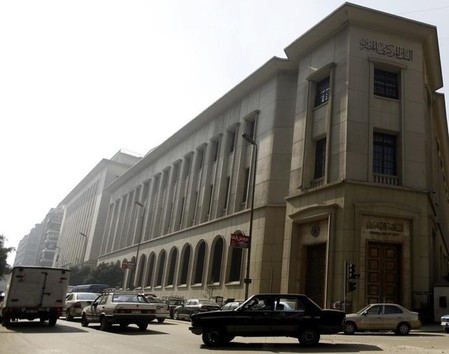CAIRO (Reuters) – Egypt’s central bank put a time limit on the tenures of CEOs of commercial lenders on Thursday, launching a purge of several top executives that puts it on a likely collision course with the country’s banking sector.
To help modernise the sector and “inject new blood”, chief executives of public and private banks as well as the heads of foreign banks operating in Egypt would have to step down after nine years, the central bank said in a statement.
The decision is the latest surprise by Tarek Amer, a central bank governor who has moved aggressively to bring dollars into a banking system starved of foreign currency and slow the rapid fall of the Egyptian pound on the black market.
The black market rate hovered at just below 10 Egyptian pounds to the dollar on Thursday compared with the official rate of 8.78 pounds per dollar.
Amer surprised markets in recent weeks by removing dollar deposit and withdrawal caps, devaluing the currency by 13 percent in a single day, declaring a more flexible exchange rate and injecting hundreds of millions of dollars despite critically low reserves.
The decision to cap CEO terms caused consternation among bankers who described it as an unexpected overreach into the private sector’s affairs.
“It’s going to have very bad consequences,” one senior finance official, who asked to be unnamed, said.
The rule will force eight top executives to resign their positions, a senior banking official told Reuters. They include Commercial International Bank’s Hisham Ezz al-Arab and Arab African International Bank’s Hassan Abdalla.
Shares in CIB were down 1.7 percent at 1126 GMT.
There was no immediate comments from the country’s leading banks on the measure, which drew criticism from Hany Tawik, head of Egypt Private Equity Association, a group that represents business community interests.
“This is interference in an essential right of the general assembly to appoint someone that is best suited for them. It’s my right as a shareholder to choose the head of the bank,” he said.
Others such as Angus Blair, the chief operating officer of Pharos Holding, said the move was positive.
“I like the new rule for bank CEOs since it should foster younger talent and help improve institutionalisation.”
The central bank’s foreign reserves have tumbled to $16.5 billion in February from around $36 billion before the 2011 uprising that ousted long-time leader Hosni Mubarak.
His fall from power and the political unrest that followed drove away tourists and foreign investors that were key sources of foreign currency.
Around 40 public and private sector banks operate in Egypt.
Both consecutive and non-consecutive CEO terms will count towards the nine-year limit, the central bank said.
(Reporting by Ehab Farouk; Additional reporting by Mostafa Hashem; Writing by Eric Knecht; Editing by Tom Heneghan)




